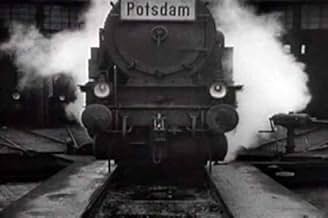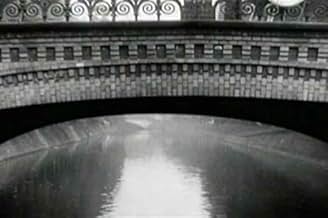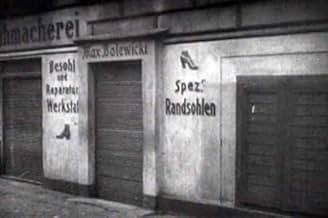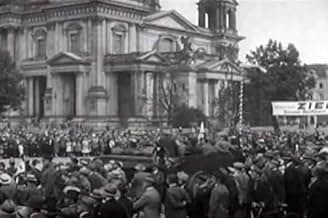Berlin, symphonie d'une grande ville
Original title: Berlin - Die Sinfonie der Großstadt
IMDb RATING
7.6/10
5K
YOUR RATING
This movie shows us one day in Berlin, the rhythm of that time, starting at the earliest morning and ends in the deepest night.This movie shows us one day in Berlin, the rhythm of that time, starting at the earliest morning and ends in the deepest night.This movie shows us one day in Berlin, the rhythm of that time, starting at the earliest morning and ends in the deepest night.
- Director
- Writers
- Star
Paul von Hindenburg
- Self
- (uncredited)
- Director
- Writers
- All cast & crew
- Production, box office & more at IMDbPro
Featured reviews
10J. Steed
Classic and splendid film that is still fascinating to watch. Walter Ruttmann did not make a documentary about Berlin, although 75 after date it certainly can be considered a document about a Berlin that is no more, he composed a film that tries to catch the essence of the atmosphere of a big city. The film is a good example of the art style Neue Sachlichkeit (functionalism): it is a cross-section of Berlin's life in which every element is equally important, shown without comment and in its totality it is the expression of the joy of Berlin's life. It is not a film about the life of Berliners, it is Berlin seen as a living mechanism.
The subtitle referring to Großstadt (big city) is the key, it could have been any other city. The idea as such is not the makers' prerogative. Elsewhere the fascination with the hustle and bustle of the big city was also present as was the idea to catch this on this film and in music: e.g. Cavalcanti in France made a film about Paris and the US Ferde Grofé composed his musical suite Metropolis (1927) with New York in his mind. The irony of all these endeavours is that the film or music is abstract, but that the result is a romanticizing view.
Ruttmann made several abstract film and he refers to them in the beginning with abstract horizontal lines dissolving to rail way tracks. In my view the rest of the film is also abstract. Although we see real people and situations the brilliant editing constantly keeps the film abstract: the situation and the people in a shot are not important, important is the juxtaposition to other shots: is the composition varied enough?. Thus we see a filmic composition (in stead of a musical one) and the subtitle Symphony is just. As with every composition the theme has to be modulated to keep it interesting and it is here where the weakness of the film is. The building up from the start and elaboration up to the beginning of the afternoon is splendid, precise and exiting; but from that point it bogs down for a while: we see another shop, another street etc. without adding much to what already was. It may be that Ruttmann was aware of this, note how quickly he finishes the afternoon to continue with the night-life and then immediately all the excitement and filmic fun is back.
In an 1939 interview cameraman Karl Freund said that everything possible was filmed using only candid cameras. I have my doubts. Let's take for example the sequence of the drowning lady: how could he make an extreme close-up with a hidden camera in such a brilliant angle? (By the way: if she really tried to commit suicide, was Freund himself not only one of the gaping bystanders without doing anything to save her?) How could he foresee the right angle to film the prostitute picking up her client near the cornered shop window? Not that it matters for the quality of the film, but it proofs the old adagium: filming is deceiving.
The subtitle referring to Großstadt (big city) is the key, it could have been any other city. The idea as such is not the makers' prerogative. Elsewhere the fascination with the hustle and bustle of the big city was also present as was the idea to catch this on this film and in music: e.g. Cavalcanti in France made a film about Paris and the US Ferde Grofé composed his musical suite Metropolis (1927) with New York in his mind. The irony of all these endeavours is that the film or music is abstract, but that the result is a romanticizing view.
Ruttmann made several abstract film and he refers to them in the beginning with abstract horizontal lines dissolving to rail way tracks. In my view the rest of the film is also abstract. Although we see real people and situations the brilliant editing constantly keeps the film abstract: the situation and the people in a shot are not important, important is the juxtaposition to other shots: is the composition varied enough?. Thus we see a filmic composition (in stead of a musical one) and the subtitle Symphony is just. As with every composition the theme has to be modulated to keep it interesting and it is here where the weakness of the film is. The building up from the start and elaboration up to the beginning of the afternoon is splendid, precise and exiting; but from that point it bogs down for a while: we see another shop, another street etc. without adding much to what already was. It may be that Ruttmann was aware of this, note how quickly he finishes the afternoon to continue with the night-life and then immediately all the excitement and filmic fun is back.
In an 1939 interview cameraman Karl Freund said that everything possible was filmed using only candid cameras. I have my doubts. Let's take for example the sequence of the drowning lady: how could he make an extreme close-up with a hidden camera in such a brilliant angle? (By the way: if she really tried to commit suicide, was Freund himself not only one of the gaping bystanders without doing anything to save her?) How could he foresee the right angle to film the prostitute picking up her client near the cornered shop window? Not that it matters for the quality of the film, but it proofs the old adagium: filming is deceiving.
`Berlin, Symphony of a Great City' is a film I've watched over and over with fascination. I think it's true that it is not so much about the people of Berlin, although we see many of them, but the city itself as a huge living, breathing organism. Back in the 1930s filmmaker John Grierson apparently wrote that this film `created nothing,' and that it violated the first principles of documentary by showing us nothing of importance but beautiful images. Looking at it more than 70 years after its creation, however, its documentary value seems evident to me, at least. I find it fascinating just to see what the people, clothing, uniforms, vehicles, streets, parks, restaurants, shops, theaters, nightclubs, and factories looked like in that distant time and place. It's amazing to contemplate how soon this complex, sophisticated society would be consumed in the most primitive debauchery. Do these people really look that much different from those we see on our streets every day? It makes me wonder what we're all potentially capable of.
Some slight differences do seem apparent, however. When a fight breaks out in a public place today, people usually try to ignore it, or even duck their heads and run for cover. But in a scene where two men argue violently in the street, the Berliners of the 1920s crowd in close around the combatants, and even try to separate them and arbitrate the dispute, before a policeman moves in. Whether this was typically European at that time, or just typical of its era, I really can't say, but it seems strange to me today.
Although I think the majority of this film was shot in a candid manner, and looks it, it's obvious that not quite all of it was un-staged, as a previous commentator has pointed out. For example, look at the argument scene just mentioned. Considering one of the camera angles (probably from a 2nd floor window), the argument must have been staged at the exact spot where this camera could catch it, and the crowd's reaction, from above. In addition, a second camera was in place at street level to move in close, which hardly suggests a serendipitous event.
A good musical score is vitally important to bring this film to life. It's too bad the original score has been lost. It would be fascinating to know what it was like. But I think the one written by Timothy Brock for the Kino edition is superb in that it captures its changing moods and rhythms. If, as one internet reviewer commented, it seems a bit melancholy, that may be apropos considering that this beautiful city, and a great many of its inhabitants, would be consumed in fire less than 20 years later.
Some slight differences do seem apparent, however. When a fight breaks out in a public place today, people usually try to ignore it, or even duck their heads and run for cover. But in a scene where two men argue violently in the street, the Berliners of the 1920s crowd in close around the combatants, and even try to separate them and arbitrate the dispute, before a policeman moves in. Whether this was typically European at that time, or just typical of its era, I really can't say, but it seems strange to me today.
Although I think the majority of this film was shot in a candid manner, and looks it, it's obvious that not quite all of it was un-staged, as a previous commentator has pointed out. For example, look at the argument scene just mentioned. Considering one of the camera angles (probably from a 2nd floor window), the argument must have been staged at the exact spot where this camera could catch it, and the crowd's reaction, from above. In addition, a second camera was in place at street level to move in close, which hardly suggests a serendipitous event.
A good musical score is vitally important to bring this film to life. It's too bad the original score has been lost. It would be fascinating to know what it was like. But I think the one written by Timothy Brock for the Kino edition is superb in that it captures its changing moods and rhythms. If, as one internet reviewer commented, it seems a bit melancholy, that may be apropos considering that this beautiful city, and a great many of its inhabitants, would be consumed in fire less than 20 years later.
This is a silent era documentary showing a day in the life of Berlin starting from the morning to the late night. It shows people and places in their day to day existence. It's artistic like showing the machinery at work. It's fascinating to see people in their everyday lives. It's amazing to see the places especially since most of them were destroyed in WWII. It's great to see living lives in this time era. This is a world in between the two Great Wars. The economic crash has yet to happen. It's a Germany which still functions with its old wealth and new technology. It's a working city. It's a great time capsule and a terrific movie by itself.
Berlin: City Symphony is one of those early experiments in montage - early as in before sound was invented and right after Battleship Potemkin changed everything. It's not always montage, as some might believe from its recommendations (i.e. Koyannasquati), as the director Walter Ruttmann is making documentary as much as city-scape. It's about a full day and night among the dwellers and the objects of a city: the moving trains, the people shuffling by about their various concerns, and the people at jobs and things like a factory at work and phones being answered used for editing fodder.
Some of this is dazzling work, cut and speed up to reflect a mood of a city that is vibrant and hectic, imaginative and crazy, and sometimes tending for the dramatic. Ruttmann also has a rather weird design with the pacing at times; a woman in one 'scene' looks over a river, and in a state of sorrow falls over. People rush over to see what has happened, and we see a shot of the water and the woman gone under... and then it cuts right away to a beauty pageant! It throws a viewer off to see Ruttmann's unconventional choices, and how images flow together like the racers (cars, horses, people, boxcars), and there develops a simple but engrossing poetry of people as "actors" in front of a camera on their daily travels or having fun like at the funshow in the auditorium. It's not always as exciting or delirious as a Russian counterpart like Man with a Movie Camera or Kino Eye, but it pays loving tribute to its city at its time and place, showing the light with the dark, the commonplace with the unusual.
Some of this is dazzling work, cut and speed up to reflect a mood of a city that is vibrant and hectic, imaginative and crazy, and sometimes tending for the dramatic. Ruttmann also has a rather weird design with the pacing at times; a woman in one 'scene' looks over a river, and in a state of sorrow falls over. People rush over to see what has happened, and we see a shot of the water and the woman gone under... and then it cuts right away to a beauty pageant! It throws a viewer off to see Ruttmann's unconventional choices, and how images flow together like the racers (cars, horses, people, boxcars), and there develops a simple but engrossing poetry of people as "actors" in front of a camera on their daily travels or having fun like at the funshow in the auditorium. It's not always as exciting or delirious as a Russian counterpart like Man with a Movie Camera or Kino Eye, but it pays loving tribute to its city at its time and place, showing the light with the dark, the commonplace with the unusual.
This fascinating classic never loses its ability to capture the attention and stimulate the imagination of its viewers. The technique is creative and resourceful, the photography is beautiful, and the images are memorable. Everything fits together to make the idea work wonderfully well.
The opening sequence with the train is an exciting and well-conceived way to start the movie. As the pace picks up, the rush of images creates an abstract but very realistic sensation, and this train 'ride' is so enjoyable that you almost don't want it to stop.
But it's when the train reaches the station that the main part of the movie begins, presenting a very interesting stylized portrait of a typical day in Berlin, through a carefully-chosen variety of scenes and sights. It's interesting to see how the train imagery keeps coming back from time to time, and this, along with the obvious passage of time as the day progresses, gives it a coherence that makes it much more than just a collage of interesting images and scenes.
There are many interesting individual sequences, but what makes it such a gem is the way that everything fits together. The overall effect is remarkable, and it really has to be seen to be appreciated.
The opening sequence with the train is an exciting and well-conceived way to start the movie. As the pace picks up, the rush of images creates an abstract but very realistic sensation, and this train 'ride' is so enjoyable that you almost don't want it to stop.
But it's when the train reaches the station that the main part of the movie begins, presenting a very interesting stylized portrait of a typical day in Berlin, through a carefully-chosen variety of scenes and sights. It's interesting to see how the train imagery keeps coming back from time to time, and this, along with the obvious passage of time as the day progresses, gives it a coherence that makes it much more than just a collage of interesting images and scenes.
There are many interesting individual sequences, but what makes it such a gem is the way that everything fits together. The overall effect is remarkable, and it really has to be seen to be appreciated.
Did you know
- TriviaThe shooting was done over 18 months though the resulting feature gives the impression of just one day in the city.
- ConnectionsFeatured in Lulu in Berlin (1984)
- How long is Berlin: Symphony of Metropolis?Powered by Alexa
Details
- Release date
- Country of origin
- Language
- Also known as
- Berlin: Symphony of a Metropolis
- Filming locations
- Berlin Cathedral, Mitte, Berlin, Germany(aka Berliner Dom)
- Production companies
- See more company credits at IMDbPro
- Runtime
- 1h 5m(65 min)
- Color
- Sound mix
- Aspect ratio
- 1.33 : 1
Contribute to this page
Suggest an edit or add missing content





















